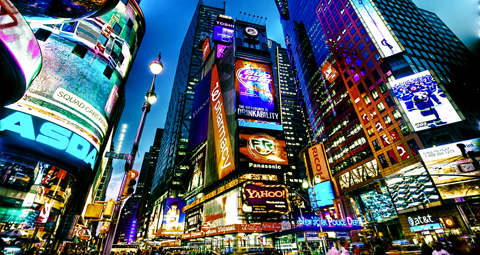November 23 | ![]() 0 COMMENTS
0 COMMENTS ![]() print
print

The bright lights of commercialism can blind us to the presence of God
In his Letter from America, Brandon McGinley reflects on a midnight stroll through Times Square and how modern society crowds God out
A few weeks ago, I got a cheeseburger in Times Square at midnight. I never had any particular desire to get a cheeseburger in Times Square before, but after 48 hours of wedding festivities in New York City with three young children, it seemed like as good an idea as any.
I had experienced Times Square many times before—the crowds, the noise, the lights, the screens. In fact, earlier that day, my wife and I thought we’d give our kids the full New York experience by briefly walking them through.
Our oldest began asking questions, as five-year-olds do, about our surroundings. I explained that everything she sees—not just in Times Square but around most of Manhattan—is designed to make people want to buy things.
She asked with that enviable innocence that, in our fallen world, must someday be purged: “Why do people want other people to buy things?”
“To get more money themselves, sweetie,” I answered.
Decadence
As I walked through Times Square that night, though, the thought that crept into my mind went beyond the human questions of greed and decadence.
As thousands of people milled about and gawked, took selfies and shopped (yes, people were buying clothes at midnight in Times Square), and as the advertisements for shows and jeans and cell phone plans lit up the night, I felt that, more than anywhere else I had ever been, it was hard to believe that God might be present here.
Of course it was a ridiculous notion, and I knew it. There’s no place or time or state of mind that God does not permeate. He knows that it is precisely when we think we no longer need Him that we need Him the most.
But we don’t know that. So much of human history has been defined by trying to make God superfluous, by trying to replace Him with concepts and objects of our own creation, by trying to assert, like self-destructive teenagers, that we can do everything on our own. And this, I think, is the lesson and purpose of places like Times Square.
The primary conscious motivations to create such a place may be ambition and greed and a kind of undisciplined creativity that regards everything the human mind can conjure as good and worthwhile.
But the deeper reason to build something so intentionally overwhelming is to crowd out God—to evoke exactly the feeling I perceived on that midnight stroll, that God cannot be here.
The modern world excels at overwhelming us with worldly concerns that make focusing on God—or even believing in His omnipresence and benevolence—increasingly difficult.
Modernity
Places like Times Square distill this aspect of modernity into its most potent and apparent form by assaulting the senses themselves: the noise of the cars and the hecklers, the sight of the billboards and video screens, the touch of the crowds and the merchandise, the smell of the food and, well, New York.
How could God live, one wonders, in the hearts of people so engrossed by utterly meaningless sensual stimulation? And yet He does—more or less, depending on how engrossed we permit ourselves to become.
The capacity and the desire of the modern world to overwhelm—or, to use Pope Benedict XVI’s word, to anaesthetise—mankind’s natural religious sense doesn’t end with extravaganzas like Times Square. It gets to us whether we live in big or small cities or towns or the countryside.
There are the obvious culprits: television, social media and smartphones, all of which can keep us in a constant state of distraction as we worry about the next show, the next post, the next text rather than our next Mass or next prayer.
But the modern world also overwhelms us with (what should be) the simple business of living. Managing household finances amid changing regulations and circumstances; planning around unpredictable work schedules; keeping modes of transportation in order; managing relationships with innumerable faceless insurance and utility corporations.
Simply staying above water can be just as overwhelming, day to day, as Times Square at midnight.
Our duty as Catholics is, first, to recognise the problem. Only then can we go about the hard work of re-consecrating time and space to God so that we can fulfill our true destiny as human beings—giving glory to God with our whole lives, and not just the smaller and smaller parts the modern world leaves for Him.










